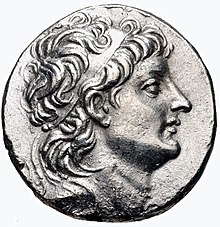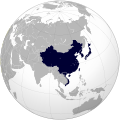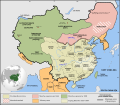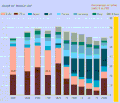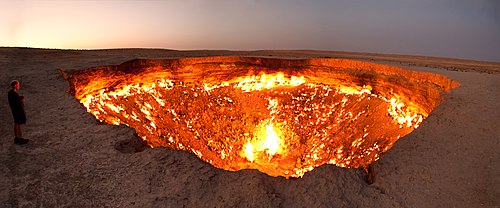Portal:Asia - Wikipedia
(Redirected from Portal:Middle East)

| Main | Geography | Projects |
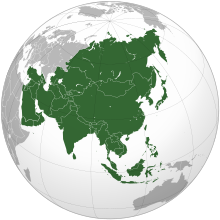
Asia ( AY-zhə, AY-shə) is the largest continent in the world by both land area and population. It covers an area of more than 44 million square kilometers, about 30% of Earth's total land area and 8% of Earth's total surface area. The continent, which has long been home to the majority of the human population, was the site of many of the first civilizations. Its 4.7 billion people constitute roughly 60% of the world's population.
Asia shares the landmass of Eurasia with Europe, and of Afro-Eurasia with both Europe and Africa. In general terms, it is bounded on the east by the Pacific Ocean, on the south by the Indian Ocean, and on the north by the Arctic Ocean. The border of Asia with Europe is a historical and cultural construct, as there is no clear physical and geographical separation between them. A commonly accepted division places Asia to the east of the Suez Canal separating it from Africa; and to the east of the Turkish straits, the Ural Mountains and Ural River, and to the south of the Caucasus Mountains and the Caspian and Black seas, separating it from Europe.
Since the concept of Asia derives from the term for the eastern region from a European perspective, Asia is the remaining vast area of Eurasia minus Europe. Therefore, Asia is a region where various independent cultures coexist rather than sharing a single culture, and the boundary between Europe is somewhat arbitrary and has moved since its first conception in classical antiquity. The division of Eurasia into two continents reflects East–West cultural differences, some of which vary on a spectrum. (Full article...)
Featured article

In Japanese folklore, kitsune (狐, きつね, IPA: [kʲi̥t͡sɨne̞] ⓘ) are foxes that possess paranormal abilities that increase as they get older and wiser. According to folklore, the kitsune-foxes (or perhaps the "fox spirits") can bewitch people, just like the tanuki they have the ability to shapeshift into human or other forms, and to trick or fool human beings. While some folktales speak of kitsune employing this ability to trick others—as foxes in folklore often do—other stories portray them as faithful guardians, friends, and lovers.
Foxes and humans lived close together in ancient Japan; this companionship gave rise to legends about the creatures. Kitsune have become closely associated with Inari, a Shinto kami or spirit, and serve as its messengers. This role has reinforced the fox's supernatural significance. The more tails a kitsune has—they may have as many as nine—the older, wiser, and more powerful it is. Because of their potential power and influence, some people make sacrifices to them as to a deity. (Full article...)
Selected Country
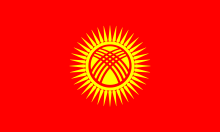
Kyrgyzstan, officially the Kyrgyz Republic, is a landlocked country in eastern Central Asia, lying in the Tian Shan and Pamir mountain ranges. Bishkek is the capital and largest city. Kyrgyzstan is bordered by Kazakhstan to the north, Uzbekistan to the west, Tajikistan to the south, and China to the east and southeast. Ethnic Kyrgyz make up the majority of the country's over 7 million people, followed by significant minorities of Uzbeks and Russians.
Kyrgyzstan's history spans a variety of cultures and empires. Although geographically isolated by its highly mountainous terrain, Kyrgyzstan has been at the crossroads of several great civilizations as part of the Silk Road along with other commercial routes. Inhabited by a succession of tribes and clans, Kyrgyzstan has periodically fallen under larger domination, for example the Turkic nomads, who trace their ancestry to many Turkic states. It was first established as the Yenisei Kyrgyz Khaganate. Later, in the 13th century, Kyrgyzstan was conquered by the Mongol Empire and under several Mongol dynasties; it regained independence, but was later invaded by the Dzungar Khanate. After the fall of Dzhungars, Kyrgyz and Kipchaks were an integral part of Kokand Khanate. In 1876, Kyrgyzstan became part of the Russian Empire, and in 1936, the Kirghiz Soviet Socialist Republic was formed to become a constituent republic of the Soviet Union. Following Mikhail Gorbachev's democratic reforms in the USSR, in 1990 pro-independence candidate Askar Akayev was elected president. On 31 August 1991, Kyrgyzstan declared independence from the USSR and a democratic government was established. Kyrgyzstan attained sovereignty as a nation state after the breakup of the Soviet Union in 1991. (Full article...)
Featured biography
Alexander II's portrait on the obverse of a tetradrachm
Alexander II Theos Epiphanes Nikephoros (Ancient Greek: Ἀλέξανδρος Θεός Ἐπιφανής Νικηφόρος Áléxandros Theós Épiphanḗs Nikēphóros, surnamed Zabinas; c. 150 BC – 123 BC) was a Hellenistic Seleucid monarch who reigned as the King of Syria between 128 BC and 123 BC. His true parentage is debated; depending on which ancient historian, he either claimed to be a son of Alexander I or an adopted son of Antiochus VII. Most ancient historians and the modern academic consensus maintain that Alexander II's claim to be a Seleucid was false. His surname "Zabinas" (Ζαβίνας) is a Semitic name that is usually translated as "the bought one". It is possible, however, that Alexander II was a natural son of Alexander I, as the surname can also mean "bought from the god". The iconography of Alexander II's coinage indicates he based his claims to the throne on his descent from Antiochus IV, the father of Alexander I.
Alexander II's rise is connected to the dynastic feuds of the Seleucid Empire. Both King Seleucus IV (d. 175 BC) and his brother Antiochus IV (d. 164 BC) had descendants contending for the throne, leading the country to experience many civil wars. The situation was complicated by Ptolemaic Egyptian interference, which was facilitated by the dynastic marriages between the two royal houses. In 128 BC, King Demetrius II of Syria, the representative of Seleucus IV's line, invaded Egypt to help his mother-in-law Cleopatra II who was engaged in a civil war against her brother and husband King Ptolemy VIII. Angered by the Syrian invasion, the Egyptian king instigated revolts in the cities of Syria against Demetrius II and chose Alexander II, a supposed representative of Antiochus IV's line, as an anti-king. With Egyptian troops, Alexander II captured the Syrian capital Antioch in 128 BC and warred against Demetrius II, defeating him decisively in 125 BC. The beaten king escaped to his wife Cleopatra Thea in the city of Ptolemais, but she expelled him. He was killed while trying to find refuge in the city of Tyre. (Full article...)
General images
The following are images from various Asia-related articles on Wikipedia.
-
Map of Asia for early 20th century (from History of Asia)
-
East Asian cultural sphere (from Culture of Asia)
-
The Taj Mahal, Agra, India (from Culture of Asia)
-
Robert Clive and Mir Jafar after the Battle of Plassey, 1757 by Francis Hayman (from History of Asia)
-
The early Muslim conquests, 622–750 (from History of Asia)
-
A view of the Fort St George in 18th-century Madras. (from History of Asia)
-
The First Persian Empire at its greatest extent, c. 500 BC (from History of Asia)
-
Projected shares of global GDP by region to 2050 (from Asian Century)
-
Political cartoon depicting the Afghan Emir Sher Ali with the rival "friends" the Russian Bear and British Lion (1878) (from History of Asia)
-
Sculpture of Prince Shōtoku (from History of Asia)
-
The third Inter-Korean Summit, which was held in 2018, between South Korean president Moon Jae-in and North Korean supreme leader Kim Jong Un. It was a historical event that symbolized the peace of Asia. (from History of Asia)
-
The Delhi Sultanate. (from History of Asia)
-
The Russian Znamensky Cathedral in Tyumen built in 1768 (from Culture of Asia)
-
British troops taking Zhenjiang from Qing troops (from History of Asia)
-
Invasions, destruction and possible population movements during the Late Bronze Age collapse, beginning c. 1200 BC (from History of Asia)
-
Deoksugung, the palace where Emperor Gojong established Korean Empire. (from History of Asia)
-
A typical example of Dravidian architecture (from Culture of Asia)
-
Đại Việt, Champa, Angkor Empire and their neighbours, late 13th century (from History of Asia)
-
Hinduism expansion in Asia, from its heartland in Indian Subcontinent, to the rest of Asia, especially Southeast Asia, started circa 1st century marked with the establishment of early Hindu settlements and polities in Southeast Asia. (from History of Asia)
-
Byzantine and Sassanian Empires in 600 AD (from History of Asia)
-
A stone image of the Buddha (from Culture of Asia)
-
Badshahi Mosque built under the Mughal emperor Aurangzeb in Lahore, Pakistan (from Culture of Asia)
-
The Mughal ambassador Khan’Alam in 1618 negotiating with Shah Abbas the Great of Iran. (from History of Asia)
-
Eunpyeong Hanok Village in Seoul, South Korea (from Culture of Asia)
-
India's middle-class population of 300 million is growing at an annual rate of 5%. Shown here is an upmarket area in South Mumbai. (from Asian Century)
-
Borobudur, a Buddhist temple in Indonesia (from Culture of Asia)
-
Tang dynasty Chinese poet Li Bai, in a 13th-century depiction by Liang Kai (from Culture of Asia)
-
Sun temple at Konarka, Odisha, India (from Culture of Asia)
-
The Han dynasty and main polities in Asia c. 200 BC (from History of Asia)
-
Angkor Wat, Khmer Empire (from Culture of Asia)
-
The Qing conquest of the Ming and expansion of the empire (from History of Asia)
-
Language families in South Asia (from Culture of Asia)
-
The Syriac Orthodox Saint Ahoadamah Church was a 7th-century church building in the city of Tikrit, one of the oldest in the world until its destruction by the Islamic State of Iraq and the Levant on 25 September 2014. (from Culture of Asia)
-
Traditional Rajasthani garments from Jaipur, Rajasthan (from Culture of Asia)
-
Chicken tikka, a well-known dish across the globe, reflects the South Asian cooking style. (from Culture of Asia)
-
Map of Vietnam showing the conquest of the south (the Nam tiến, 1069–1757). (from History of Asia)
-
The Great Wall of China at Jinshanling (from Culture of Asia)
-
Gojong (1852–1919), the 26th king of Joseon dynasty and the first emperor of Korean Empire. (from History of Asia)
-
The Silk Road in Asia (from History of Asia)
-
Detail of Chinese silk from the 4th century BCE. The characteristic trade of silk through the Silk Road connected various regions from China, India, Central Asia, and the Middle East to Europe and Africa. (from History of Asia)
-
A Confucian ritual ceremony in Jeju, South Korea (from Culture of Asia)
-
The Hindu-Buddhist temple of Angkor Wat. (from History of Asia)
-
Population concentration and boundaries of the Western Zhou dynasty in China (from History of Asia)
-
Map of Asia (from Culture of Asia)
-
Some henges at Göbekli Tepe in Turkey were erected as far back as 9600 BC, predating those of Stonehenge, by over seven millennia. (from History of Asia)
-
The Qing Empire in 1832. (from History of Asia)
-
Detail of the Dragon Throne used by the Qianlong Emperor of China, Forbidden City, Qing dynasty. Artifact circulating in U.S. museums on loan from Beijing (from Culture of Asia)
-
Machiya in Heian period (from History of Asia)
-
the Goryeo ware, which shows splendid culture of Goryeo in mediaeval Korea. (from History of Asia)
-
The Great Wave off Kanagawa, c. 1830 by Hokusai, an example of art flourishing in the Edo Period (from History of Asia)
-
Map of Marco Polo's travels (from History of Asia)
-
Daian-ji temple at Nara, Japan (from Culture of Asia)
-
Dome of the Rock, an Islamic shrine in Jerusalem. (from Culture of Asia)
-
The Grand Mosque in Kuwait City, one of the largest mosques in the region (from Culture of Asia)
-
Battle of Talas between Tang dynasty and Abbasid Caliphate c. 751 (from History of Asia)
-
The Taipei 101 skyscraper in Taipei, Taiwan, which was the tallest building in the world from 2004 to 2010 (from Asian Century)
-
Balhae in the north, Later Silla in the south (from History of Asia)
-
Projected GDP of 7 largest economies in 2050 (from Asian Century)
-
The Song dynasty and main polities in Asia c. 1200 (from History of Asia)
-
Korean peninsula in 476 AD. There are three kingdoms and Gaya Union in the picture. This picture shows the heyday of Goguryeo (from History of Asia)
-
The global contribution to world's GDP by major economies from 1 AD to 2003 AD according to Angus Maddison's estimates. Before 18th century, China and India were the two largest economies by GDP output. (from Asian Century)
-
Here a Jesuit, Adam Schall von Bell (1592–1666), is dressed as an official of the Chinese Department of Astronomy. (from History of Asia)
-
Daily life of people from the Song period at the capital, Bianjing, today's Kaifeng (from History of Asia)
-
Political map of Asia in 1860 (from History of Asia)
-
Gyeonghoeru of Gyeongbokgung, the Joseon dynasty's royal palace. (from History of Asia)
-
Ancient ziggurat, Iraq (from Culture of Asia)
-
Kabsa also called Majboos, famous in Saudi Arabia, Kuwait, Qatar, Oman, Bahrain, and United Arab Emirates (from Culture of Asia)
Featured picture
The Darvaza gas crater, also called the "Door to Hell" or the "Gates of Hell" by locals, a crater of natural gas that has been burning since 1971, is located in the Karakum Desert in Turkmenistan. The crater is a major tourist attraction, with hundreds of visitors arriving each year.
Did you know...
- ... that although he was a former Indonesian prime minister, Soekiman Wirjosandjojo was not arrested during a political purge as he was considered a non-threat?
- ... that Fakhruddin Ali Ahmed, India's second Muslim president, was also the second Indian president to die in office?
- ... that the Empire of Japan turned a Korean royal cemetery at what is now Hyochang Park into a golf course?
- ... that Levantine Arabic is often written in Hebrew characters online by Bedouin, Arab Christians, and Druze in Israel?
- ... that Ein Samiya, which provides the water for Taybeh, the first beer brewed in Palestine, was depopulated in 2023 after harassment by neighboring Israeli settlers?
- ... that the popularity of "10 Minutes" by Korean singer Lee Hyori led to 2003 being dubbed the "year of Hyori" by domestic media?
- ... that Sun Haiyan is the first Chinese ambassador to Singapore who was not a member of the Foreign Ministry of China?
- ... that University of Nebraska alumnus M. Khalid Roashan helped draft the 1964 Constitution of Afghanistan?
- ... that the Pakistani film Shehr e Tabassum was the first animated cyberpunk film to be made by an Urdu development team?
- ... that the Te'omim Cave in Israel was home to a Bronze Age alabaster quarry, a refuge cave during the Jewish–Roman wars, and a possible center for necromantic activity in late antiquity?
Updated: 6:33, 14 February 2024
In the news
- 10 October 2024 – Israel-Hamas war
- An Israeli strike on a school sheltering displaced people in Gaza kills 27 people. (AP)
- 10 October 2024 – Israel–Hezbollah conflict
- At least 22 people are killed in Israeli airstrikes that hit two different areas in central Beirut, Lebanon. (AP)
- 10 October 2024 – Russo–Ukrainian war
- The World Bank approves a new financial intermediary fund made of grants from the United States, Japan, Canada, and other countries coupled with interest from frozen Russian assets to give to Ukraine as part of a 50 billion USD loan. (Reuters)
- 10 October 2024 – Israel–Italy relations, Israel–Hezbollah conflict
- Italian Prime Minister Giorgia Meloni summons the Israeli ambassador in Rome after Israeli forces target bases manned by Italian peacekeepers in southern Lebanon. (CNN)
- 10 October 2024 –
- Multiple Palestinian, Dutch, and Jewish human rights organizations sue the Dutch government for exporting weapons and military goods to Israel, thus allegedly failing to prevent alleged war crimes in the Gaza Strip. (Reuters)
- 10 October 2024 – Nobel Prize in Literature
- This year's Nobel Prize in Literature is awarded to South Korean writer Han Kang "for her intense poetic prose that confronts historical traumas and exposes the fragility of human life”. (Nobel Prize)
Major Religions in Asia
Middle East
Central Asia and Surroundings
Indian Subcontinent
Southeast Asia
East Asia
Selected panorama
Credit: Bluemangoa2z
The Hajj is an annual Islamic pilgrimage to Mecca, Saudi Arabia, the holiest city for Muslims, and a mandatory religious duty for Muslims that must be carried out at least once in their lifetime by all adult Muslims who are physically and financially capable of undertaking the journey, and can support their family during their absence.
Topics
Categories
The following Wikimedia Foundation sister projects provide more on this subject:
-
Commons
Free media repository -
Wikibooks
Free textbooks and manuals -
Wikidata
Free knowledge base -
Wikinews
Free-content news -
Wikiquote
Collection of quotations -
Wikisource
Free-content library -
Wikiversity
Free learning tools -
Wikivoyage
Free travel guide -
Wiktionary
Dictionary and thesaurus
More portals
Shortcuts to this page: Asia portal • P:ASIA Purge server cache
